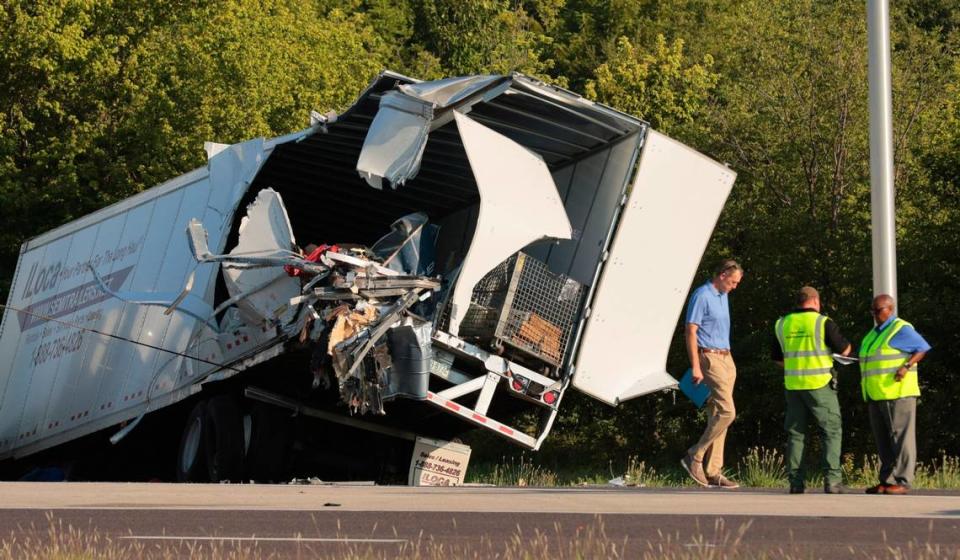Madison County bus crash involved semis sitting on exit ramp. Why do truckers park there?
Illinois highway exit ramps sometimes become unauthorized semitruck parking lots because the state doesn’t have enough parking spaces for all the truck drivers who travel through it, according to state and regional trade groups.
Federal regulations put limits on how long truck drivers can work before they have to find a place to pull over and rest. The law aimed to make travel safer by keeping exhausted truck drivers off the road. But the leaders of the Mid-West Truckers and Illinois Truck Enforcement associations say it creates potentially dangerous situations when state rest areas fill up.
On Wednesday, a Greyhound bus ran into three semitrucks that were parked on the Interstate 70 exit ramp to a rest area near Highland at around 2 a.m. Three people died in the crash and at least 14 others were injured.
Madison County Coroner Steve Nonn identified those who died as Bradley D. Donovan, 47, of Springfield, Illinois; Buford Paya, 71, of Supai, Arizona; and Juan E. Vasquez-Rodriguez, 34, of Passaic, New Jersey.
Tom Chapman, a National Transportation Safety Board member, said investigators from the federal agency are traveling to Madison County to investigate the cause of the crash. As of Wednesday, he couldn’t say why the semis were parked on the I-70 ramp but confirmed rest area safety is one of the issues the board will investigate.
It is illegal for any vehicle to park on the roadway, including semis on exit ramps.
Chapman said investigators will determine whether the National Transportation Safety Board should make any recommendations to prevent similar crashes in the future.
Trade groups called for additional parking for years
Don Schaefer, president and CEO of the Mid-West Truckers Association, said his organization and others have been calling for solutions to the truck parking shortage for years.
“It’s one of those accidents that’s been waiting to happen,” Schaefer said of Wednesday’s crash. “... The issue’s been around for 10 years, easy. By the grace of God there aren’t more accidents.”
Marc Fisher, executive director of the Illinois Truck Enforcement Association, said his organization partners with the Mid-West Truckers Association and advocates similarly on the issue of parking.
The Illinois Truck Enforcement Association is comprised of both police officers and trucking industry members.
“Obviously we would like to see these guys in parking lots and safe locations,” Fisher said. “I think it’s a safety concern when anything is parked on the side of the road.”
The issue isn’t limited to Illinois roads, but it is pronounced in the Prairie State. Illinois was one of fives states that truck drivers cited most often as having a truck parking shortage in a national survey on the issue from 2019.
American Trucking Associations, the largest trade association for the trucking industry, has been working with federal, state and local governments to increase the number of truck parking spaces across the country, according to group spokesman Sean McNally.
McNally noted that earlier this year members of Congress introduced legislation that would authorize $755 million in competitive grant funding for states to expand truck parking capacity. U.S. Rep. Mike Bost, R-Illinois, is among the sponsors of the proposed Truck Parking Safety Improvement Act.
What Illinois is doing about semitruck parking shortage
Earlier this year, Gov. J.B. Pritzker announced the state was investing $7.2 million in federal funds to expand three interstate rest areas, adding 122 parking spaces for commercial trucks.
Two of the rest areas are near Springfield and the third is near Fort Massac State Park in southern Illinois, according to a report by Land Line Magazine from the Owner-Operator Independent Drivers Association.
Paul Wappel, a spokesman for the Illinois Department of Transportation, said the agency is planning the expansions now and will continue to review options to provide more parking spaces in the future.
Schaefer, of the Mid-West Truckers Association, said he thinks Illinois could use twice the number of parking spots it has for semis.
“It’s like a boat without a harbor. There’s no place to go,” he said of some areas in Illinois.
The state transportation agency is also exploring pilot projects to provide real-time information to truck drivers about the number of available commercial truck parking spaces. Other states have taken similar measures. Kansas, for example, alerts truck drivers to the number of open parking spaces at upcoming rest areas through a system of live-updating digital signage on the roads.
Schaefer said his group is part of ongoing state and national meetings taking place on the issue of parking, but bureaucracy moves slowly.
“We are finally starting to address the situation, but it’s not going to be solved overnight,” he said.


